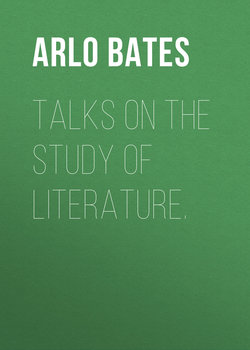Читать книгу Talks on the study of literature. - Bates Arlo, Putnam Eleanor - Страница 5
V
FALSE METHODS
ОглавлениеThe most common intellectual difficulty is not that of the lack of ideas, but that of vagueness of ideas. Most persons of moderately good education have plenty of thoughts such as they are, but there is a nebulous quality about these which renders them of little use in reasoning. This makes it necessary to define what is meant by the Study of Literature, as in the first place it was necessary to define literature itself. Many have a formless impression that it is something done with books, a sort of mysterious rite known only to the initiated, and probably a good deal like the mysteries of secret societies, – more of a theory than an actuality. Others, who are more confident of their powers of accurate thinking, have decided that the phrase is merely a high-sounding name for any reading which is not agreeable, but which is recommended by text-books. Some take it to be getting over all the books possible, good, bad, and indifferent; while still others suppose it to be reading about books or their authors. There are plenty of ideas as to what the study of literature is, but the very diversity of opinion proves that at least a great many of these must be erroneous.
In the first place the study of literature is not the mere reading of books. Going on a sort of Cook's tour through literature, checking off on lists what one has read, may be amusing to simple souls, but beyond that it means little and effects little. As the question to be asked in regard to a tourist is how intelligently and how observantly he has traveled, so the first consideration in regard to a reader is how he reads.
The rage for swiftness which is so characteristic of this restless time has been extended to fashions of reading. By some sort of a vicious perversion, the old saw that he who runs may read seems to have been transposed to "He who reads must run." In other words there is too often an assumption that the intellectual distinction of an individual is to be estimated by the rapidity with which he is able to hurry through the volumes he handles. Intellectual assimilation takes time. The mind is not to be enriched as a coal barge is loaded. Whatever is precious in a cargo is taken carefully on board and carefully placed. Whatever is delicate and fine must be received delicately, and its place in the mind thoughtfully assigned.
One effect of the modern habit of swift and careless reading is seen in the impatience with which anything is regarded which is not to be taken in at a glance. The modern reader is apt to insist that a book shall be like a theatre-poster. He must be able to take it all in with a look as he goes past it on a wheel, and if he cannot he declares that it is obscure. W. M. Hunt said, with bitter wisdom: "As print grows cheap, thinkers grow scarce." The enormous increase of books has bred a race of readers who seem to feel that the object of reading is not to read but to have read; not to enjoy and assimilate, but to have turned over the greatest possible number of authors. This idea of the study of literature is as if one selected as the highest social ideal the afternoon tea, where the visitor is presented to numberless strangers and has an opportunity of conversing rationally with nobody.
